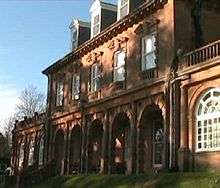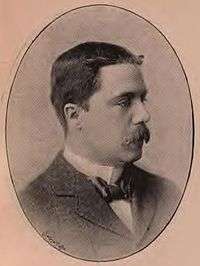Elliott Lees
Lieutenant-Colonel Sir Elliott Lees, 1st Baronet, DSO (23 October 1860 – 16 October 1908), was a British Conservative Party politician.


Lees was educated at Eton and Christ Church, Oxford.
Lees was elected to the House of Commons for Oldham in 1886, a seat he held until 1892, and later represented Birkenhead from 1894 to 1906.[1]
In 1897 he was created a Baronet, of South Lytchett Manor in Lytchett Minster in the County of Dorset.[2]
Lees was an officer in the Dorsetshire Yeomanry. He volunteered for active service during the Second Boer War, and on 24 February 1900 was appointed a captain of the 26th (Dorsetshire) Company serving in the 7th Battalion, Imperial Yeomanry,[3][4][5] which left England for South Africa on the SS Manchester Merchant in early March.[6] He was mentioned in despatches and awarded the Distinguished Service Order (DSO) in November 1900.[7] After his return to the United Kingdom he was appointed a supernumerary major of the regiment in January 1902.[8]
Lees married Florence Keith, daughter of Patrick Keith, in 1882. He died in October 1908, aged 47, and was succeeded in the baronetcy by his eldest son Thomas. Lady Lees died in 1917.
Notes
- Craig, F. W. S. (1989) [1974]. British parliamentary election results 1885–1918 (2nd ed.). Chichester: Parliamentary Research Services. ISBN 0-900178-27-2.
- "No. 26823". The London Gazette. 16 February 1897. p. 900.
- "No. 27168". The London Gazette. 23 February 1900. p. 1255.
- "No. 27171". The London Gazette. 6 March 1900. p. 1528.
- "The War - The Imperial Yeomanry". The Times (36055). London. 2 February 1900. p. 11.
- "The War - Embarcation of Troops". The Times (36080). London. 3 March 1900. p. 16.
- "No. 27359". The London Gazette. 27 September 1901. p. 6306.
- "No. 27398". The London Gazette. 17 January 1902. p. 389.
References
- Kidd, Charles, Williamson, David (editors). Debrett's Peerage and Baronetage (1990 edition). New York: St Martin's Press, 1990.
- Leigh Rayment's list of baronets
- Lundy, Darryl. "FAQ". The Peerage.
External links
- Hansard 1803–2005: contributions in Parliament by Sir Elliott Lees
| Parliament of the United Kingdom | ||
|---|---|---|
| Preceded by J. T. Hibbert James Mackenzie Maclean |
Member of Parliament for Oldham 1886–1892 With: James Mackenzie Maclean |
Succeeded by Joshua Milne Cheetham Sir J. T. Hibbert |
| Preceded by Viscount Bury |
Member of Parliament for Birkenhead 1894–1906 |
Succeeded by Henry Vivian |
| Baronetage of the United Kingdom | ||
| New creation | Baronet (of South Lytchett Heath Manor) 1897–1908 |
Succeeded by Thomas Evans Keith Lees |